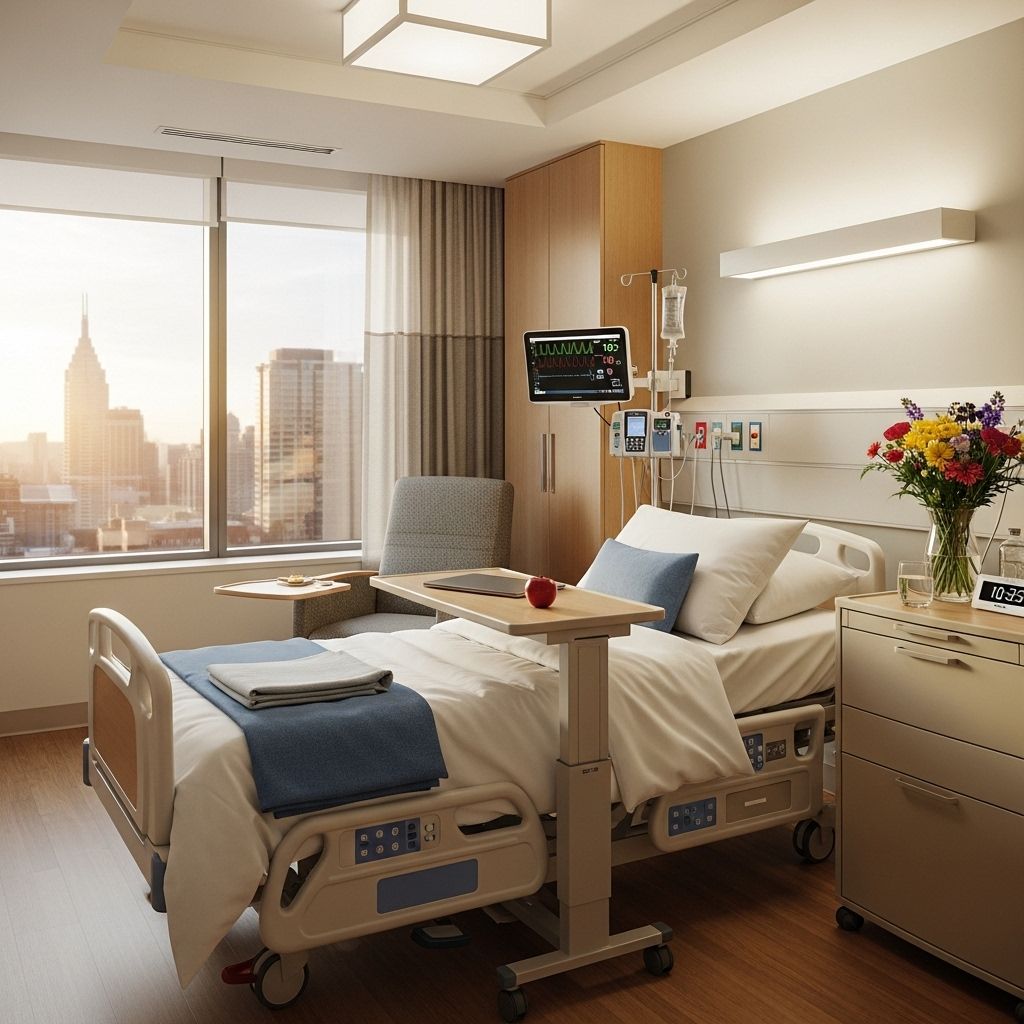Your Hospital Room at Johns Hopkins: What to Expect
A detailed guide to your Johns Hopkins hospital room experience: amenities, safety, privacy, and what you need to know.

Understanding your hospital environment is essential for a comfortable and healing stay. At Johns Hopkins Hospital, patient rooms are designed with safety, privacy, and convenience in mind—helping you focus on recovery. Below is what you and your loved ones can expect during your time as an inpatient at Johns Hopkins, including room features, visiting policies, personal items, safety measures, and discharge procedures.
Introduction to Your Hospital Stay
Being admitted to the hospital can be an overwhelming experience, whether planned or unexpected. At Johns Hopkins, every effort is made to offer a safe, clean, and comforting environment. You will have access to professional care, modern amenities, and support resources for you and your visitors.
Hospital Room Overview
- Private and semi-private rooms: Most patients are assigned private rooms when available, though some units do offer semi-private accommodations. Room type depends on your needs and availability.
- Clean, quiet, healing environment: Rooms are designed for comfort, healing, and privacy. Housekeeping staff maintain these spaces daily to ensure cleanliness and prevent infections.
- Patient-centered features: Each room typically includes an adjustable hospital bed, a bedside table, a chair for visitors, a television, telephone access, and a private or shared bathroom.
Personalizing Your Space
While you are welcome to bring personal items for comfort—such as photographs, books, or a robe—please be mindful of space limitations and infection control policies. Only essential and safe items should be brought, and any electrical appliance must be checked by staff before use.
Amenities and Services
- Television: Most rooms are equipped with cable television, free of charge. Channels include news, educational programs, and entertainment options. Remote controls are sanitized between uses.
- Telephone: Outgoing calls can usually be made directly from your bedside phone. Long distance calls require a calling card or operator assistance.
- Internet/Wi-Fi: Free wireless internet access is available throughout the hospital, allowing you to stay connected with loved ones and access online resources.
- Mail and parcels: Letters and parcels can be sent and received. The hospital staff will deliver mail directly to your room.
- Housekeeping services: Your room is cleaned daily, and linens are changed regularly. Please alert staff if you have any specific cleaning needs.
- Food and nutrition: Dietitians work with your care team to provide nutritious meals that meet your health needs and preferences. Menus are available in your room, and staff can assist you with ordering meals.
Privacy and Safety in Your Room
- Private conversations: Your health information is kept confidential. Conversations with your care team take place in your room or designated private spaces.
- Secure belongings: While security is a priority, it is best to leave valuables at home or entrust them to a family member. The hospital is not liable for lost personal items, though small safes may be available for valuables.
- Identification checks: Staff will frequently verify your identity by asking your name and checking your wristband—an important safety measure to ensure you receive the correct care and medications.
- Infection control: Strict hand-washing and infection control policies are enforced. Hand sanitizer is widely available, and staff will wear protective equipment as necessary.
Medical Equipment in Your Room
Your room may be equipped with medical devices such as monitoring equipment, infusion pumps, or oxygen tanks, depending on your care needs. These devices are checked regularly by clinical staff to ensure safety and functionality.
Visitor Guidelines and Policies
- General visiting hours: Johns Hopkins generally encourages visits from family and friends as they are essential for emotional healing. However, visiting hours may vary by unit and are sometimes modified during flu season or in response to public health concerns.
- Number of visitors: Room size and patient needs may limit the number of visitors at one time, especially in semi-private rooms. Please check with your nurse for any restrictions.
- Children as visitors: Children are welcome when accompanied by an adult, but some areas may have age restrictions for safety reasons.
- Special considerations: Intensive care units and certain specialty units may have additional policies, including stricter visiting hours and visitor screening.
- Quiet hours: To support rest and recovery, quiet hours are observed during overnight periods. Visitors are asked to respect patients’ need for sleep and minimize noise.
- Overnight stays: In some cases, a family member may be permitted to remain overnight in the room. Please coordinate with your care team to discuss arrangements, as accommodations and policies vary by unit.
Visitor Responsibilities
All visitors must observe infection prevention protocols, including hand hygiene and refraining from visiting if they are ill. They must also adhere to hospital policies regarding photography, mobile device usage, and respect for other patients’ privacy.
Communicating with Your Care Team
- Staff introductions: Expect each member of your care team to introduce themselves. Feel free to ask for clarification about anyone’s role or responsibilities.
- Whiteboards and care schedules: Each room typically has a whiteboard where care plans, important contacts, and daily goals are displayed. Use this board to jot down questions or notes for your healthcare team.
- Rounding: Doctors, nurses, and therapists will visit to check on your progress. Family members are encouraged to participate in these rounds and ask questions.
- Interpreter services: Language services and translators are available for patients who prefer to communicate in a language other than English.
Personal Belongings and Valuables
- What to bring: Bring only what you need for your hospital stay, such as essential toiletries, comfortable clothing, glasses, hearing aids, and denture supplies.
- What to leave at home: Expensive jewelry, large amounts of cash, and irreplaceable items should be left at home for safekeeping.
- Securing items: A small safe may be available in some rooms. Otherwise, give valuables to a trusted family member or request a hospital safe for items like personal medications.
Meals, Food Services, and Dietary Needs
- Daily meal service: Patients are offered three meals per day, with choices that take into account allergies, religious preferences, and dietary restrictions.
- Room service: Many units allow patients to order meals at their preferred times, within physician-approved guidelines.
- Snacks and guest trays: Snacks are available for patients. Family members and visitors may purchase meal vouchers or guest trays from the cafeteria or food court.
- Assistance with eating: Staff are available to help patients who are unable to feed themselves or have special requirements.
Hospital Policies and Patient Expectations
- Identification bands: All patients must wear hospital-issued identification bands for the duration of their stay for safety and medication accuracy.
- In-hospital mobility: Ask your nurse before leaving your room or moving about the unit, as your condition might require supervision or assistance.
- Fire and safety drills: The hospital conducts regular safety drills. If an alarm sounds, please remain calm and follow staff instructions.
- Smoking and substance policies: Johns Hopkins is a tobacco- and substance-free campus. Smoking, vaping, and use of non-prescribed substances are not permitted anywhere within the hospital or on hospital grounds.
Discharge Planning and Leaving the Hospital
Planning for your departure begins as soon as you are admitted. The care team coordinates your discharge to ensure a smooth transition home or to another care facility. You will receive instructions regarding:
- Medications and prescriptions
- Follow-up appointments
- Symptoms that require attention
- Transportation arrangements
- Home care services, if needed
Before leaving, your nurse will review discharge instructions with you and your family, answer any questions, and confirm you have everything you came with. Personal belongings are double-checked, and any assistance with mobility or specialized equipment will be arranged ahead of time.
Role of Family and Caregivers
- Active involvement: Families are partners in care. They are encouraged to stay informed, participate in decision-making, and advocate for the patient’s needs.
- Support during procedures: Family members may stay with patients during some procedures where permitted, or wait in designated lounges.
- Caregiver resources: The hospital offers resources for caregivers, including support groups, social workers, and counseling services.
Accessible and Inclusive Care
- Language and interpretation: Qualified medical interpreters and translated informational materials are available.
- Physical accessibility: The facility is wheelchair-accessible and provides specialized equipment for patients with disabilities.
- Religious and spiritual needs: Chaplaincy services, prayer rooms, and connections to local faith leaders are available upon request.
Special Policies and Additional Resources
- Pets and service animals: Certified service animals are welcome in patient areas, subject to hospital policies. Pets and emotional support animals may require special permission and coordination in advance.
- Lost and found: Report any lost belongings to the nursing station. Items are logged and stored securely until claimed.
- Language assistance, hearing devices: Assistive technology, including hearing aids, TTY phones, and visual alerts, is available on request.
- Patient advocacy and ethics services: Dedicated teams support you in navigating complex medical or ethical situations.
Frequently Asked Questions (FAQs)
Q: How do I contact nursing staff from my room?
A: Every room is equipped with an emergency call button and intercom system. Press this for assistance at any time; a nurse will respond promptly.
Q: Can my family spend the night in my room?
A: In most private rooms and some units, one adult family member may stay overnight. Please ask your nurse for arrangements and available sleeper chairs or cots.
Q: Are visitors allowed during all hours?
A: Visiting hours and policies vary by unit and may be modified during public health events or for patient safety. Most units observe standard visiting hours, but exceptions can be made for immediate family at the care team’s discretion.
Q: What should I do if I lose something during my stay?
A: Notify staff immediately. Lost items are turned in to the unit’s nursing station or the hospital’s lost and found department, where you may reclaim them.
Q: How is patient confidentiality protected?
A: All hospital staff adhere to strict privacy protocols, including complying with HIPAA regulations. Your health information is shared only with authorized personnel.
Q: What if I need help communicating in English?
A: Language interpretation services are available 24/7. Notify your care team, who will arrange an interpreter in your preferred language.
Contact Information and Further Assistance
For questions about your hospital room or stay, ask your nurse or call the hospital operator from your bedside phone. For more detailed concerns regarding visitor policies, accommodations, or hospital amenities, consult with patient relations or your care team.
References
- https://www.shemmassianconsulting.com/blog/how-to-get-into-johns-hopkins-medical-school
- https://nursing.jhu.edu/magazine/articles/2024/08/admissions-cycle-overview-what-to-expect-when-you-are-applying/
- https://www.youtube.com/watch?v=_j5ri0j8vRY
- https://www.youtube.com/watch?v=KnNaPzR-AEE
- https://www.simlaweb.it/wp-content/uploads/2019/07/the-johns-hopkins-hospital-patient-handbook.pdf
- https://www.johnshopkinssolutions.com/solution/hospital-at-home/
- https://www.hopkinsscleroderma.org/patients/appointment/
Read full bio of Sneha Tete












